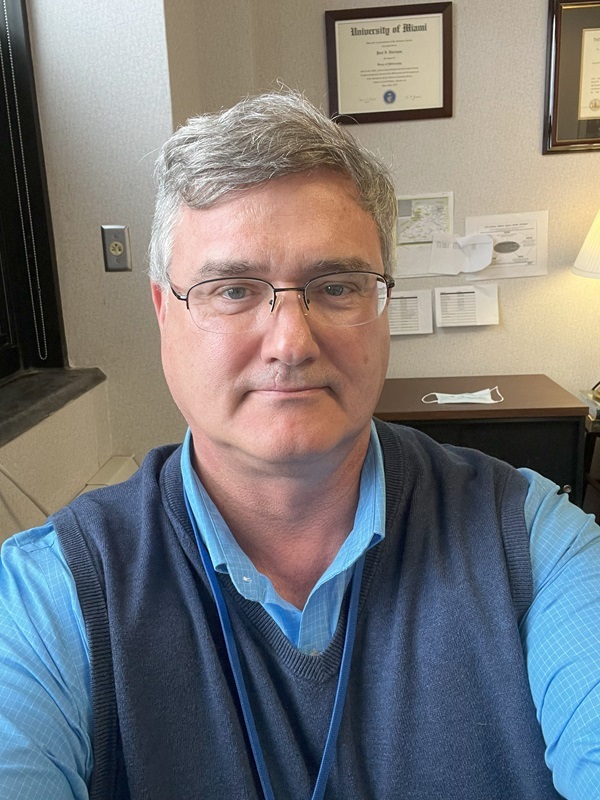World Mental Health Day is October 10th
By Amy Diana Ramirez
Lewiston, New York, October 7, 2023
Doesn’t it seem like mental health meltdowns are becoming increasingly frequent among celebrities and laypeople alike? Since the lockdowns of 2020, new cases of Post Traumatic Stress Disorder, major depression, anxiety, and other distressing psychological conditions are still on the rise. It seems appropriate that we have an official World Mental Health Day in October, right before the exacerbation of the holiday season has a chance to set in. Now is an ideal time to reconsider your own psychological well-being and, if needed, seek professional assistance from someone experienced, reputable, and who seems to genuinely care.
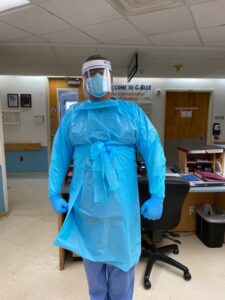
One such provider is Dr. Paul Harrigan, a licensed psychologist, Army Major, and former Marine who has commenced a private psychotherapy practice in Lewiston (near Buffalo), New York. During COVID-19’s peak, he was on the frontlines and was featured in the article Call to Service: Army Psychologist on the COVID-19 Battlefront by Thomas Brading. The Hollywood Times Journalist Amy Diana Ramirez is fortunate to know Harrigan from their being in the same cohort for their graduate studies in psychology in the late 90s at Columbia University, Teachers College. Even decades later, the two are still dear friends who are familiar with each other’s capabilities. Hence, Ramirez’s natural inclination was to interview Harrigan for World Mental Health Day, for he is one of her favorite classmates who went all the way.
RAMIREZ: Please share how your path towards a psychology career came about.
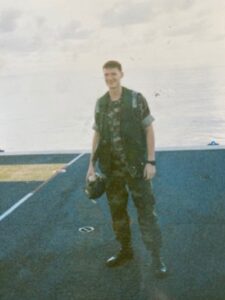
HARRIGAN: I was born in 1969 and raised by blue-collar hard-working parents, along with a great older sister and brother, in Western New York State, that is Niagara Falls, Buffalo areas. We did not have a lot of money, but my folks did great to provide for us and instilled a hard work ethic. Growing up in the 70’s and 80’s was cool I must say. Watching HBO’s Stranger Things that was me and my friends, going to arcades, Dungeons and Dragons, Walkmans, minus the monsters. The Cold War was a reality and I recall the Niagara Falls Power Station being a target for Russian nukes, had the war gone hot! Then the summer before my junior year in high school (1986), I had a terrible bike accident that resulted in the right side of my face nearly being torn off. I was on my bike, going downhill, when I heard something, looked over my left shoulder, and then blacked out. I awakened with EMTs working on me, they looked in shock. I was a mess and had no idea how bad it was, until arrival at the ER when I saw the look on everyone’s faces, some averting their gaze. I would then go through what I recall as a very long and painful surgery as the nurses and doctors did what they could to put me back together. I would end up with nearly 400 stitches and a long recovery in which my bandages had to be changed several times a day by my family. During my entire junior year of high school, I had to wear a netmask to hold the bandages, while I underwent several surgeries to repair them. This event had an impact on my worldview and my place in it. No more was I naïve to suffering, and out of suffering, I was attracted to existential literature and philosophy, pondering the meaning of life. College was not something my family could afford, nor did I have a drive for it at the time, plus I wanted to push the envelope to challenge myself, so I enlisted in the United States Marines. Where I grew up and, in those days, everyone was expected to attend college, and even my guidance counselor tried to talk me into it, but I would find that joining and serving in the Marines to have been one of the best decisions of my life. Little did I know that experience would set the stage for a lifetime of service.
Ramirez: What was it like being a young US Marine?
Harrigan: I was surprised by the level of responsibility that we young Marines had but with great mentors and guidance accomplished great things each day elevating my sense of self-worth and confidence not only in job performance but leadership and teamwork. After the storied Marine Corps boot camp at Parris Island, South Carolina, I ended up being trained and working in the field of administration and logistics during my four years of active duty.
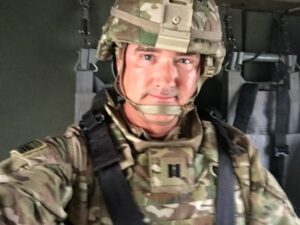
Two years into my enlistment I was deployed with the US Marine 22nd Expeditionary Unit, serving aboard the USS Saipan, a US Navy Amphibious Assault carrier. Halfway into a routine deployment, we were called (in the Summer of 1990), to Liberia, Africa, to provide security and evacuation of US and other foreign personnel during that country’s outbreak of civil war. I was just twenty years old and this was my first war experience, witnessing the devastation and its effect on the people that we helped, but also among my fellow Marines and Sailors, including myself. This same summer, Kuwait was invaded by Iraq, and so started the Persian Gulf War. When our mission in Africa was over, my unit headed home, to be refitted for desert warfare, but the war ended, so we did not have to go, and all those service members started going home. As we departed Africa, I told myself no matter what I did in life, I would find a profession to help others and help the world.
RAMIREZ: Was there any person in particular who inspired your career?
HARRIGAN: I did not know what to call it back then, but we were having trouble readjusting back on the Homefront, there was lots and lots of drinking, getting in trouble, fighting, more drinking, and that was pretty much the norm for us. Then one day a Navy Chaplain made his rounds and tried to talk to us, get to know us, and offer alternatives with our spare time, so I began volunteering with him with some of my buddies. I sadly do not recall this good Chaplain’s name, but by shadowing him, and seeing how he was helping Marines and Sailors, and their families by talking, I became inspired. I was that Marine my buddies came to for advice and the one they complained about when I was encouraged not to fight. This Chaplain was the first to counsel me on the dangers of drinking and to find other ways to enjoy/cope with life. As I headed toward discharge, I was in a pretty good place, mentally.
Upon discharge in 1992, I attended the wonderful Niagara County Community College and excelled in academics because I was so motivated to learn how to help others. I am a big fan of the Community College system; the entire staff encouraged my education and my exploration of careers in human services, where I would meet a terrific psychologist and the light bulb went on: I thought I want to be a psychologist (to help people).
I became aware of the many years of study ahead, and the very challenging, competitive nature of applying and succeeding in the field of Psychology, but the Marines taught me that with the proper motivation, I could literally do anything.
RAMIREZ: As a Major in the US Army, do you find yourself doing plenty of public speaking on mental health matters?
HARRIGAN: As an undergraduate student I became involved in student leadership and so began public speaking, and yes, I was anxious at first, but it was something to practice. I continued as a student leader at Teachers College, Columbia University in the late 90s’s (earned a master’s degree in Counseling Psychology) and then on to my PhD program at the University of Miami, where I continued speaking. As a doctoral student, I became employed by the Department of Veteran Affairs, Miami Vet Center. I worked full-time as a readjustment counselor for veterans and their family members while concurrently pursuing my doctorate full-time. [This was in 2000.] I would provide direct service counseling and groups for WWII, the Korean War, Vietnam, Gulf War, and all conflicts in between. You see, being a Marine who had deployed, I fit well and was so honored to find my passion for helping our Veterans.
Once 9/11 occurred, I was tasked with a lot of public speaking for pre-and post-deployment briefings for units, as well as providing plenty of education to the community regarding service member readjustment, post-wartime life, and for those coping with other trauma.
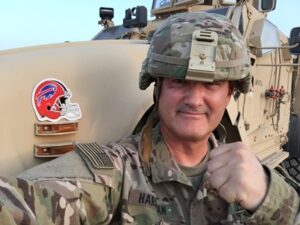
After my Ph.D. was complete, I re-entered the military with the US Army to become a Behavioral Health Officer. Therefore, in my civilian career with increased management and leadership, I was often called on to speak to the community about Veterans, readjustment, and many other pressing matters. I truly enjoy speaking to groups of people, large and small, to get the word out on mental health concerns and the help that is available.
RAMIREZ: Which orientation and methods have proven to be most effective when it comes to treating Post-Traumatic Stress Disorder (PTSD)?
HARRIGAN: At Columbia University and fitting with my existential background my foundation is Humanistic Psychology of the great Dr. Carl Rogers. It has been from the start, and it is to this day – to help people become their best self, to Self-Actualize, helping people discover the barriers toward this goal and how to overcome it.
In working with trauma for nearly two decades is key, is for the provider of care to be genuine in heart in their care, with a non-judgmental stance, to create a safe place for the person you are helping. Safety is a key part of the treatment, knowing trauma processing is not something to be rushed. First step is to help the person with education about their symptoms, so they can label emotions, along with relaxation/grounding skills, so they can develop emotional and behavioral stability. Along the way, they may or may not share their trauma; a lot can be done before getting to the trauma stories. Evidence-Based Trauma practices have grown in the past couple of decades and at the National Center for PTSD. These are all outlined to include but not limited to Cognitive Processing Therapy, Exposure Therapy, Seeking Safety, and other manualized treatments to help a person safely process trauma.
If the client has a trusting therapeutic relationship with their Psychologist/Counselor/Clinical Social Worker, etc., then eventual processing the event in counseling can help the healing process. I feel it is important for trauma survivors or anyone coping with mental health concerns to know that they are not alone and that there is help available from people who truly care.
RAMIREZ: Do you ever work with clients who are dealing with Body Dysmorphic Disorder or Gender Dysphoria?
HARRIGAN: In my career thus far, I have had a few clients with BDD and Gender Dysphoria. As I am not a subject matter expert in these areas, I link with community collaterals who are for my clients as issues are worked through.
RAMIREZ: Are you conducting therapy sessions remotely as well as treating people in person?
HARRIGAN: The Challenges of COVID-19 quarantine helped advance telemedicine greatly to where we are today, and it continues to grow bringing medical services to remote and underserved areas. In 2017 while serving in Iraq we used telemedicine to reach Service Members in remote areas linked with mental health. The VA Hospitals have done wonders with telemedicine. In my current practice, many of my clients do come to my office in person, and a good number use teletherapy.
RAMIREZ: Do you believe that remote/teletherapy sessions are just as effective as being in person?
HARRIGAN: I feel using teletherapy is a skill set for the provider to become comfortable with, in order make the person on the other end comfortable as well. The key to any good counseling therapy is the building of a trusting relationship, and this can certainly be achieved via telemedicine. In my experience, teletherapy can be just as effective, in person. So, it becomes a fit between what is feasible for the client to attend, by what means in person or teletherapy, works for them, then we as the therapist can provide. I live in the Buffalo, New York, area, and with winter on the way, many clients will choose teletherapy to stay out of the cold and off slippery roads! In my area, I do like how I have clients from areas far away from me in rural areas where without telehealth counseling for them would not be possible.
RAMIREZ: What is your advice for aspiring psychologists?
HARRIGAN: My advice in life is no matter your field of interest seek out mentors who can offer advice and guidance along the way. I may suggest attending national/regional psychology conferences to see and learn that the field is much broader than the clinical practice of my career. I am clinical, but there are many more psychology professions from full-time time researchers, professors, organizations, sports, school, etc.
RAMIREZ: What would you say to someone who is contemplating entering the armed forces?
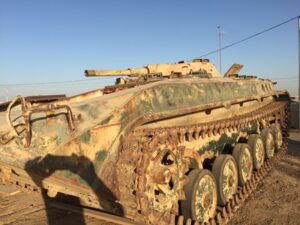 HARRIGAN: In thinking of joining the Armed Forces, I recommend folks meet with recruiters from all branches, learn of all the jobs and skills they can learn, and make a fully informed decision, as well as options for Active Duty, Reserves, or National Guard, Officer or Enlisted. The military is not for everyone. It is a deeply personal choice… to embark on a field you can expect to be put in harm’s way. Freedom is not Free by any means.
HARRIGAN: In thinking of joining the Armed Forces, I recommend folks meet with recruiters from all branches, learn of all the jobs and skills they can learn, and make a fully informed decision, as well as options for Active Duty, Reserves, or National Guard, Officer or Enlisted. The military is not for everyone. It is a deeply personal choice… to embark on a field you can expect to be put in harm’s way. Freedom is not Free by any means.
RAMIREZ: Which quote do you live by?
HARRIGAN: “To thine own self be true and you will be false to no one” – William Shakespeare.
I hope sharing some of my life and profession as a psychologist, as a civilian, and in the military can serve to inspire others to a life of service to others whatever that may be. – Paul Harrigan 10/7/23.

Dr. Harrigan can be reached by email: Paulpsyche42@gmail.com
With the arrival of World Mental Health Day, why not consider replacing the standard “How are you today?” with this worthwhile question, (depending on who you encounter): “How is your mental health today?” You might be astonished, delighted, or horrified by what you hear.
Resources:
Veterans Crisis Line/ Website: https://www.veteranscrisisline.net/
Department of Veteran Affairs: www.va.gov Provides information for Health Care (locations, etc.) and Benefits.
VA Vet Center Program: https://www.vetcenter.va.gov/ Community-Based Clinics for War Theatre Veterans / Bereavement for Families/ Military Sexual Trauma Services.


